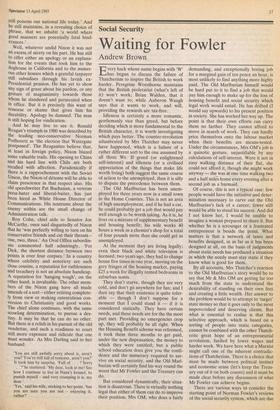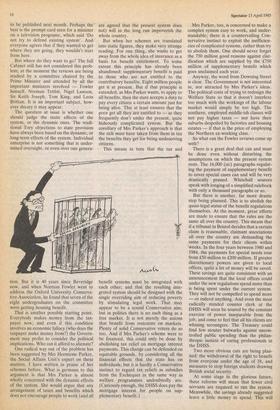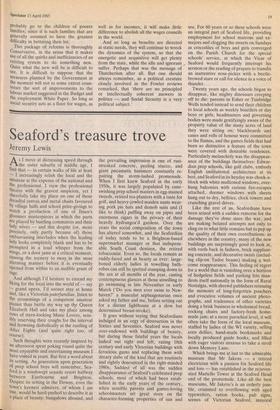Social Security
Waiting for Fowler
Andrew Brown
Every hack whose name begins with 'W' has begun to discuss the failure of Thatcherism to inspire the British to work harder. Peregrine Worsthorne maintains that the British proletariat (what's left of it). won't work; Brian Walden, that it doesn't want to; while Auberon Waugh says that it wants to work, and will, providing the rewards are tax-free.
Idleness is certainly a more romantic, gentlemanly vice than greed, but before deciding which is more fundamental to the British character, it is worth investigating which pays better. The counter-revolution adumbrated by Mrs Thatcher may never have happened, which is a failure of a rather different sort to the one assumed by all three Ws. If greed (or enlightened self-interest) and idleness (or a civilised appreciation of the things that make life worth living) both suggest the same course of action to the unemployed, then it is silly to dispute the precedence between them.
The Old Marlburian has been unem- ployed for three years now in a small town in the Home Counties. This is not an area of high unemployment, and if he had a car, he could probably get a job that would pay well enough to be worth taking. As it is, he lives on a mixture of supplementary benefit and housing benefit; his wife works 40 hours a week in a chemist's shop for a total of four pounds more than she could get as unemployed.
At the moment they are living legally; even their black and white television is licensed; two years ago, they had to change house five times in one year, moving on the grey fringes of the housing market, paying £25 a week for illegally rented bedrooms in suburban semis.
They don't starve, though they are very cold, and don't go anywhere for fun; and I dare say that their existence is quite toler- able — though I don't suppose for a moment that I could stand it — if it is considered statically. They have certain needs, and these needs are for the the most part met. Providing no emergencies crop up, they will probably be all right. When the Housing Benefit scheme was reformed, it took them three months to get paid, under the new dispensation, the money to which they were entitled; but a public school education does give you the confi- dence and the numeracy required to sur- vive on social security, and the Old Marl- burian will certainly find his way round the worst that Mr Fowler and the Treasury can do.
But considered dynamically, their situa- tion is disastrous. There is virtually nothing legal that either of them can do to improve their position. Mrs OM, who does a fairly
demanding, and exceptionally boring job for a marginal gain of ten pence an hour, is most unlikely to find anything more highly paid. The Old Marlburian himself would be hard put to it to find a job that would pay him enough to make up for the loss of housing benefit and social security which legal work would entail. He has drifted (I would say upwards) to his present position in society. She has worked her way up. The point is that their own efforts can carry them no farther. They cannot afford to move in search of work. They can hardly price themselves onto the labour market when their benefits are means-tested. Under the circumstances, Mrs OM's job is a quixotic gesture, unjustifiable by any calculations of self-interest. Were it not in easy walking distance of their flat, she could not afford it, though she might work anyway — she was at one time walking two and a half miles home every evening after a second job as a barmaid.
Of course, this is not a typical case: few people would have the initiative and deter- mination necessary to carve out the Old Marlburian's lack of a career; fewer still would be able to stand his success. And did I not know her, I would be unable to imagine a woman prepared to share it. But whether he is a scrounger or a frustrated entrepreneur is beside the point. What matters is that a network of taxes and benefits designed, in as far as it has been designed at all, on the basis of judgments about static needs has produced a situation in which the needy must stay static if they know what is good for them.
By all accounts, Mrs Thatcher's reaction to the Old Marlburian's story would be to say that Mr & Mrs OM are getting far too much from the state to understand the desirability of standing on their own feet and creating a little wealth. Her answer to the problem would be to attempt to 'target' state money so that it goes only to the most impoverished and deserving clients. But what is essential to realise is that this selective approach, which is based on a sorting of people into static categories, cannot be combined with the other Thatch- erite great hope of an entrepreneurial revolution, fuelled by lower wages and harder work. We have here what a Marxist might call one of the inherent contradic- tions of Thatcherism. There is a choice that must be made between political instinct and economic sense (let's keep the Treas- ury out of it on both counts) and it must be made clear before any discusssion of what Mr Fowler can achieve begins.
There are various ways to consider the starting point of Norman Fowler's reviews of the social security system, which are due to be published next month. Perhaps the ' best is the prompt card seen for a minister on a television programe, which said 'Do not try to defend existing system'. And everyone agrees that if they wanted to get where they are going, they wouldn't start from here.
But where do they want to go? The full Cabinet still has not considered this prob- lem; at the moment the reviews are being studied by a committee chaired by the Prime Minister and attended by all the important ministers involved — Fowler himself, Norman Tebbit, Nigel Lawson, Sir Keith Joseph, Tom King, and Leon Brittan. It is an important subject, how- ever dreary it may appear.
The question at issue is whether one should judge the static effects of the system, or the dynamic ones. The tradi- tional Tory objections to state provision have always been based on the dynamic, or long-term effects of the system. Individual enterprise is not something that is under- mined overnight, or even over one genera- tion. But it is 40 years since Beveridge now, and when Norman Fowler went to address the Oxford University Conserva- tive Association, he found that seven of the eight undergraduates on the committee were getting housing benefit.
That is another possible starting point. Everybody makes money from the tax- payer now; and even if this condition involves an economic fallacy (who does the taxpayer make money from?) the Govern- . ment may prefer to consider the political implications. Who can it afford to alienate?
One radical way out of the problem has been suggested by Mrs Hermione Parker, the Social Affairs Unit's expert on these matters. I have written in praise of her schemes before. What is germane to this argument is that Mrs Parker is almost wholly concerned with the dynamic effects of the system. She would argue that any arrangement of taxes and benefits which does not encourage people to work (and all are agreed that the present system does not) will in the long run impoverish the whole country.
But when her schemes are translated into static figures, they make very strange reading. For one thing, she wants to get away from the whole idea of insurance as a basis for benefit entitlement. To some extent this principle has already been abandoned: supplementary benefit is paid to those who are not entitled to the contributory benefits. Eight million people get it at present. But if that principle is extended, as Mrs Parker wants, to apply to all benefits, then the state accepts a duty to pay every citizen a certain amount just for being alive. This at least ensures that the poor get all they are entitled to — as they frequently don't under the present, quite hideously complicated system. But the corollary of Mrs Parker's approach is that the rich must have taken from them in tax the benefits they get for being undeserving citizens.
This means in turn that the tax and benefit systems must be integrated with each other; and that the resulting inte- grated system should be designed with the single overriding aim of reducing poverty by stimulating legal work. That may appear to be a sound Conservative aim; but in politics there is no such thing as a free market. It is not merely the unions that benefit from restraints on markets. Plenty of solid Conservative voters do so too. And if Mrs Parker's scheme were to be financed, this could only be done by abolishing tax relief on mortgage interest payments. This change can be defended on equitable grounds, by considering all the financial effects that the state has on individuals; but it is hardly a Conservative instinct to regard tax reliefs as subsidies from the Exchequer in the same way as welfare programmes undoubtedly are. (Curiously enough, the DHSS does pay the mortgage interest for people on sup- plementary benefit.) Mrs Parker, too, is concerned to make a complex system easy to work, and under- standable; there is a countervailing Con- servative instinct to exploit the inefficien- cies of complicated systems, rather than try to abolish them. One should never forget the 750 million good reasons against clar- ification which are supplied by the £750 million of supplementary benefit which goes unclaimed each year.
Anyway, the word from Downing Street is clear. The Government is not interested in, nor attracted by Mrs Parker's ideas.
The political costs of trying to redesign the Welfare State so that it doesn't interfere too much with the workings of the labour market would simply be too high. The southern, employed middle-ish classes will
not pay higher taxes — nor have their suburbs despoiled by factories and housing estates — if that is the price of employing the Northern ex-working class.
So what can the Fowler reviews come up with?
There is a great deal that can and must be done even without disturbing the assumptions on which the present system rests. The 16,000 (sic) paragraphs regulat- ing the payment of supplementary benefit to cover special cases can and will be very drastically pruned. Whitehall sources speak with longing of a simplified rulebook with only a thousand paragraphs or so. But there is another, far more drastic step being planned. This is to abolish the quasi-legal status of the benefit regulations themselves. At the moment, great efforts are made to ensure that the rules are the same all over the country. This means that if a tribunal in Bristol decides that a certain claim is reasonable, claimant associations all over the country are demanding the same payments for their clients within lweeks. In the four years between 1980 and 1984, the payments for special needs rose from £50 million to £200 million. If greater discretionary powers are given to local offices, quite a lot of money will be saved. These savings are quite consistent with an announcement that the local offices could under the new regulations spend more than is being spent under the current system. They will not be compelled to spend more — or indeed anything. And even the most radically minded counter clerk at the DHSS will soon be soured by the constant exercise of power inseparable from the job, and come to feel that all his clients are whining scroungers. The Treasury could find few stouter bulwarks against uncon- trolled public spending than the philan- thropic insticts of caring. professionals in the DHSS.
Two more obvious cuts are being plan- ned: the withdrawal of the right to benefit from everyone under the age of 18, and measures to stop foreign students drawing British social security.
At some stage in the glorious future, these reforms will mean that fewer civil servants are required to run the system. Meanwhile, the savings already suggested leave a little money to spend. This will Probably go to the children of poorer families; since it is such families that are generally assumed to have the greatest difficulty in bettering their lot.
This package of reforms is thoroughly Conservative, in the sense that it makes use of all the quirks and inefficiencies of an existing system to do something new. Quite what the new will be is difficult to see. It is difficult to suppose that the measures planned by the Government at the moment will not to some extent coun- teract the sort of improvements to the labour market suggested in the Budget and the employment White Paper. So long as social security acts as a floor for wages, as
well as for incomes, it will make little difference to abolish all the wages councils in the world.
And so long as benefits are directed at static needs, they will continue to wreck the dynamics of the system, so that the energetic and acquisitive will get plenty from the state, while the idle and ignorant suffer. Perhaps that was the message of Thatcherism after all. But one should always remember, as a political creature closely involved in the Fowler reviews remarked, that 'there are no principled or intellectually coherent answers in politics — and Social Security is a very political subject.'
















































 Previous page
Previous page